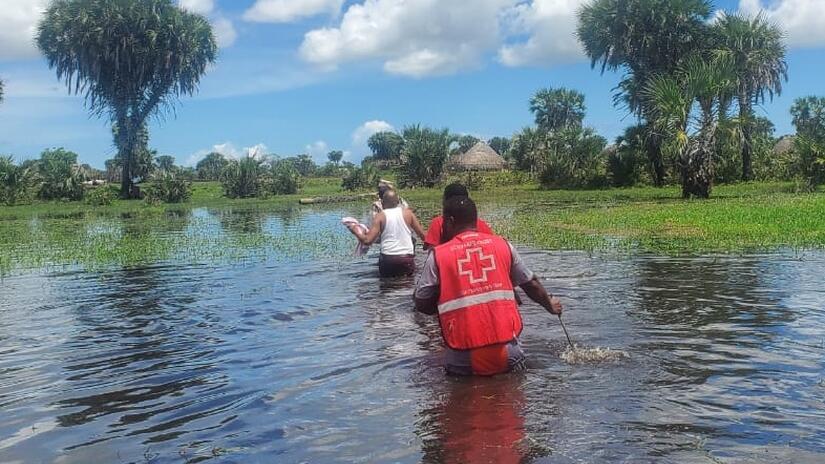Geneva/Dubai: In a stark warning ahead of the Climate Convention ‘Conference of the Parties’ (‘COP28’), the Secretary General of the International Federation of Red Cross and Red Crescent Societies (IFRC), Jagan Chapagain, has said the climate and environmental crisis is a “multiplier”, exacerbating almost every humanitarian disaster his organisation faces.
On the eve of the convention in Dubai, Jagan Chapagain, who is on the COP28 Advisory Committee said:
“Whether it’s a hunger crisis and people forced to move because of drought, a health emergency exacerbated by heat, killer flooding caused by exceptional rain, disputes over diminishing tracts of arable land or an uptick in malaria deaths due to warmer temperatures, climate change plays a role in exacerbating the impact of so-called ‘natural’ disasters. The climate and environmental crisis is the biggest global challenge the IFRC faces. Addressing its impacts means addressing the base issues that turn hazards into disasters and doing that at the base level where people are most affected. If we want to tackle humanitarian disasters, it really is ‘All About That Base’.”
Climate or extreme weather was a contributing factor to the vast majority - new analysis suggests 94% - of all impact-causing natural hazards between 2018 and 2022. And that proportion, according to an IFRC report1, increases every year. Climate change is unequivocally making the impacts of those hazards worse too; the subsequent ‘natural’ disasters - measured through factors including damaged buildings and crops, injuries and deaths – get ever more serious.
But natural hazards, even as climate change makes them more common and more fierce, only become disasters because of inequality, exclusion and a lack of support when and where it’s needed most. When adaptation investment happens, when anticipatory work is done where it matters, where local communities are prepared and where the right finance is in place before and after weather events hit, disastrous consequences are not inevitable.
The IFRC is a global organisation focused on preventing, adapting to, and relieving the impacts of disasters. That’s why recognising the base reasons that hazards exacerbated by climate change turn into disasters – and addressing them at the local, base, level - matters so much.
At COP, IFRC leaders and experts will argue that a humanitarian catastrophe can only be avoided through a mix of mitigation (reducing emissions to stop temperature rises beyond 1.5 degrees), adaptation to a world inevitably warmer than today’s, and accelerated efforts to avert, minimise and address losses and damages. They will say that the focus for adaptation should be on base issues in the countries, communities and crises most affected by climate change, but seeing the least adaptation funding. And they will argue that the most effective projects and initiatives are at the community-led; grassroots initiatives that work from the base up.
Physically at COP28 and participating remotely, the IFRC has leaders and climate experts available to talk to the media. They include:
-
Francesco Rocca, IFRC President
-
Jagan Chapagain, Secretary General of IFRC
-
Caroline Holt, IFRC Director of Climate, Disaster and Crisis
-
Kirsten Hagon, IFRC Head of Climate Policy
-
Jonathan Stone, IFRC Climate and Resilience Manager
Also available for interviews are ‘climate champions’ with stories of tackling climate change and its impacts ‘at its base’. These include:
Kevin Douglas from the Jamaican Red Cross
Kevin is working with the local government to ensure better local community knowledge of the importance of nature in reducing risks. He encourages and leads the planting of mangroves to prevent flooding, for example.
Sonia Mercedes Paz Salas from the Colombian Red Cross
The Colombian Red Cross pioneered a transformative project in flood-prone Colombian river-bank communities. This meant engaging the community to construct stilt houses and a critical 1.1km footbridge, ultimately enhancing living conditions for river-bank families and safeguarding over 5,500 individuals in neighbouring villages. This is a vital precedent for disaster resilience in the region.
Prisca Chisala from the Malawi Red Cross
When Cyclone Freddy hit in March, the Malawi Red Cross was on the frontline of dealing with hundreds of thousands of people displaced, and in tackling a cholera outbreak. And although 200 people died in the storm, it would have been much worse but for the anticipatory actions and the innovative ways warnings were issued across the affected area.
For more information or to set up an interview: [email protected]
In Geneva: Andrew Thomas +41 76 367 65 87,
Tommaso Della Longa +41 79 708 43 67
In Dubai: Melis Figanmese +41 79 202 20 33
Aleksandra “Saša” Gorišek: +41792130425

